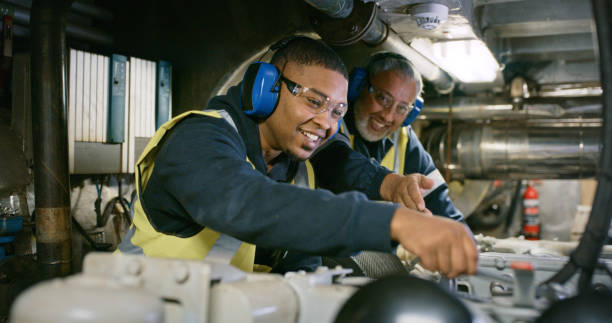Apprenticeships provide an opportunity for people to gain the skills and knowledge needed to work in specific fields. They typically last between two to four years, and during this time, apprentices receive training and experience in their chosen field.
Apprenticeships can be found in both civil and mechanical sectors, and they offer a competitive salary with benefits. Given the current job market in the UK and the benefits of apprenticeships, it is important to find out all you need to know about apprenticeships in the UK.
This article clearly answers the question; of how many apprenticeships you can do in the UK. It will provide other important details you need to know.
Table of contents
- What Is Apprenticeship?
- What Is The Benefit Of Apprenticeships In The UK?
- Types of Apprenticeships In The UK
- Eligibility For Apprenticeship In The UK
- How Does Apprenticeship Work In The UK?
- How Can I Apply for Apprenticeships in the UK?
- What Are The Entry Requirements For Apprenticeship In The UK?
- How Many Apprenticeships Can You Do In The UK?
- What Are The Advantages of Multiple Apprenticeships?
- Are There Challenges of Pursuing Multiple Apprenticeships?
- Can International Students Do Apprenticeship In The UK?
- How Much Does Apprentice Get Paid?
- FAQs On How Many Apprenticeships Can You Do In The UK
- Conclusion
- References
- We Also Recommend
What Is Apprenticeship?
An apprenticeship is a training program that combines class-based education and practical training in a real-life workplace.
Let’s say you want to become an IT assistant manager in a company, but your practical skills don’t match employers’ demands. So you decide to attend an apprenticeship program through which you’re under the supervision of an experienced IT specialist.
Usually, practical training accounts for most of an apprenticeship, but there are also academic lectures to attend. To a certain degree, the type of apprenticeship you undertake will determine the whole schedule.
What Is The Benefit Of Apprenticeships In The UK?
An apprenticeship is an amazing way to supplement your academic understanding with real-world experience and prevail in a cutthroat employment market.
You will acquire a variety of personal talents as well as some practical ones that you will need in the long run. You will gain the ability to work together towards common objectives, manage stress, accept responsibility, and remain devoted to your tasks.
To increase the employability of students, many academics and companies advise students to do at least one apprenticeship.
SEE ALSO: Who Is Eligible For A Student Loan In The UK?
Types of Apprenticeships In The UK
In the United Kingdom, apprenticeships offer a diverse range of opportunities for individuals to gain practical skills and experience while earning a wage. These apprenticeships cover various industries and sectors, catering to different interests and career goals
Here are the four main apprenticeship levels in the UK:
- Intermediate Apprenticeships (Level 2). This level is equivalent to GCSE (General Certificate of Secondary Education) standards.
- Advanced Apprenticeships (Level 3). This level is equivalent to passing two A levels.
- Higher Apprenticeships (Level 4 and above). The Level 4 qualification is equivalent to an undergraduate degree or an HNC (Higher National Certificate).
- Degree Apprenticeships (Levels 5 – 7). The final and highest level of apprenticeships in the UK is equivalent to a foundation degree or an HND (Higher National Diploma).
READ ALSO: What Level Apprenticeships Can You Do After GCSE?
Eligibility For Apprenticeship In The UK
Apprenticeships in the UK are available to individuals of different age groups. You can typically start an apprenticeship at the age of 16, but some advanced or degree-level apprenticeships may have higher age requirements.
You must be a resident of the UK and have the right to work in the country. This includes UK citizens, European Union (EU) and European Economic Area (EEA) nationals, and certain other categories of individuals with the right to work.
Apprenticeships in the UK are open to both domestic and international students. However, keep in mind that normal work is what the government considers an apprenticeship to be, thus as an international student, you are subject to certain limitations.
It’s important to research and carefully read the eligibility criteria provided for each apprenticeship opportunity you are interested in.
If you meet the requirements, you can then apply for the apprenticeship through the designated application process, which often includes submitting a CV and attending interviews or assessments.
SEE ALSO: How Many UCAS Points Do You Get For T-Levels?
How Does Apprenticeship Work In The UK?
Taking up an apprenticeship involves working at a real job while learning to enhance your knowledge and experience within the position. You may also get paid for the job done, although the pay is usually less than what professionals earn.
By the end of your apprenticeship, you must have gained the skills and knowledge needed to either succeed in your chosen career or progress to the next apprenticeship level.
Depending on the level, an apprenticeship can be finished in one to five years. Your field of duty determines the number of years of service and the qualifications attained. Successful apprentices eventually obtain a certificate of completion. These certificates might consist of:
- Functional skills: GCSE-level qualifications in English, maths and IT.
- National Vocational Qualifications (NVQs) – from Level 2 (comparable to five GCSEs) up to Level 7 (similar to a postgraduate degree).
- Technical certificates – such as BTEC, City, and Guild Progression Award, etc.
- Academic qualifications – including a Higher National Certificate (HNC), Higher National Diploma (HND), foundation degree, or the equivalent of a full bachelor’s degree.
READ ALSO: Is There a Maximum Age for University in the UK?
How Can I Apply for Apprenticeships in the UK?
Just like applying to study at a college or university, the application process for working as an apprentice in the UK involves some required steps. Follow the steps below when applying to become an apprentice:
1. Know the age requirements
In the UK, you must be 16 or older to work as an apprentice. Additionally, you must have the certifications that your industry requires. The apprenticeship center is where you may learn more because they are industry-specific. You can be qualified for additional assistance from the government if you are older than 19.
2. Know the entry requirements for each level
Before you may advance to the next level of an apprenticeship, you must meet specific requirements for that level, and you can only do so if you meet those requirements. The prerequisites for each level are as follows:
- Intermediate apprenticeship: For this level, you must be at least 16 years old and finished with full-time school.
- Advanced apprenticeship: You might need documentation of prior experience in a comparable position, a credential equating to GCSEs in the 9th through the fourth grade, or an intermediate apprenticeship certification to qualify for this level.
- Higher apprenticeship: To be eligible for this level, you must provide a five 9-4 grade GCSE and a level three qualification certification, which may include a BTEC National or A-level.
- Degree apprenticeship: To be suited for this level, you may provide proof of previous work experience, a five 9-4 GCSE grade, a higher apprenticeship qualification certification, and three A-levels.
READ ALSO: Apprentice Age Limit: Is There an Age Limit for Apprenticeships?
3. Do research
Employers often won’t advertise openly that they are seeking apprentices. Visit the website of your favorite employer and conduct some research to find out if there are any available positions. Then apply to demonstrate your love for the industry and your familiarity with the business.
4. Learn new skills
Employers will primarily consider those who are resourceful and can learn new concepts at a fast pace. Acquire new skills, especially those relevant to the industry you want to serve.
Learning about what employers are looking for and being able to demonstrate your ability in this area can make you more competitive than other candidates.
5. Prepare a suitable CV
Create a professional CV with pertinent information and keywords to highlight your qualifications. Make sure to separate it appropriately and write it in a straightforward typeface.
You must provide your name, contact information, ability, skills, and experience under the profile subheading.
Your educational credentials, honors, and accomplishments are listed under the title “education.” Any prior employment you had that was relevant to the position is included in the work experience section.
Although it is not required, you might provide any unrelated job experience along with interests and hobbies that are relevant to the position.
Related Post: When Do You Do Your Year 11 GCSE Mock Exams?
6. Write a cover letter
Your cover letter should clearly state your qualifications as noted in your CV. Write a cover letter to give more insight into your passion, goals, and how you plan on achieving them. Also, state how beneficial the position can be to achieving your goals as you contribute to the organization’s growth and development.
7. Prepare for an interview
Although not always the case, you may participate in an interview. Prepare by doing adequate research on the organization, its value, and its mode of operation.
Research your roles and possible questions that your potential employer may ask and prepare answers to them. Also, come up with questions to ask your potential employer. Improve your communication skills and be punctual to the interview.
What Are The Entry Requirements For Apprenticeship In The UK?
As each type of apprenticeship offers a different-level qualification on the Qualifications and Credit Framework (QCF), their entry requirements will vary. Generally speaking, they are as follows:
- To apply for an intermediate apprenticeship, you’ll just need to be over 16 years old and no longer in full-time education.
- For an advanced apprenticeship, you’re likely to be asked for prior work experience and at least three 9-4 grade GCSEs or equivalent – such as an intermediate apprenticeship qualification.
- As higher apprenticeships are the equivalent of a foundation degree, HNC, or first year of a Bachelor, you’ll usually need at least five 9-4 grade GCSEs, as well as some Level 3 qualifications in relevant subjects, to apply. Your Level 3 qualifications could be AS-levels, a BTEC National, or a Level 3 NVQ.
- Degree apprenticeships will have the tightest entry requirements. These may include three A-levels in a specified grade range or a higher apprenticeship qualification, on top of at least five 9-4 GCSE grades. It’s also likely you’ll be required to have prior work experience.
You can apply for apprenticeships at any time of year – whether you’re successful depends on if an employer has a vacancy. You’ll be able to check the specific entry requirements of your chosen apprenticeship once the position opens.
How Do I Find an Apprenticeship in the UK?
The UK has unlimited opportunities and career choices, but it takes a lot to succeed. Each year, thousands of students graduate from college, and some of them struggle to get the ideal job.
Due to the intense competition, only individuals with exceptional practical abilities are in demand. As a result, apprenticeships are practically required in the UK.
Here are the best places to find apprenticeship opportunities in the UK:
1. Contact your university
If you’re currently attending university and would like to gain relevant work experience through an apprenticeship program, you can first ask your university for help. The Universities in the UK maintain strong links with local employers; therefore, they can provide useful information if there’s any apprenticeship on offer.
SEE ALSO: How Many Hours is Classed as Full-time Education in the UK?
2. Check the Government’s official website
The UK Government shares an extensive range of available apprenticeships on its official website. All you need to do is create an account on their online platform and wait for regular alerts for any relevant apprenticeships to become available.
3. Check the UCAS website
You can find apprenticeship opportunities in the UK on the UCAS website.
How Many Apprenticeships Can You Do In The UK?
In the UK, there is no fixed limit to the number of apprenticeships a person can undertake.; you can do as many as you like. Nothing is stopping you from applying to university through UCAS, while also applying for apprenticeship vacancies.
There are some important considerations and factors to keep in mind if you’re thinking about pursuing multiple apprenticeships:
1. Concurrent Apprenticeships:
Technically, you can undertake more than one apprenticeship at a time, but it’s rare. This typically happens when an individual is completing a higher-level apprenticeship (e.g., Level 4 or 5) while simultaneously mentoring or supervising someone in a lower-level apprenticeship (e.g., Level 2 or 3).
It’s important to note that juggling multiple apprenticeships can be challenging due to the time and commitment required for each.
2. Legal and Regulatory Considerations:
The UK government has specific rules and regulations governing apprenticeships, including the requirement that apprentices spend at least 20% of their working hours on off-the-job training. Taking on multiple apprenticeships may raise questions about meeting this requirement for each.
3. Employer Policies:
Employers may have policies regarding apprenticeships, including whether they allow their employees to undertake additional apprenticeships simultaneously. Some employers may be supportive, while others may have restrictions in place.
4. Time Management:
Undertaking multiple apprenticeships can be demanding and require excellent time management skills. You’ll need to balance your work responsibilities, off-the-job training, and any coursework or assessments for each apprenticeship.
5. Quality of Experience:
It’s important to consider the quality of the apprenticeship experience. Rushing through multiple apprenticeships may not allow you to fully develop the skills and knowledge needed for each role.
6. Career Goals:
Think about your long-term career goals. Multiple apprenticeships can provide a diverse skill set, but it’s essential to ensure they align with your overall career plan.
7. Financial Implications:
Apprenticeships often come with a salary, so you should consider the financial implications of taking on multiple apprenticeships. Be sure you can cover your living expenses and any other financial commitments.
8. Employer Support:
If you plan to undertake multiple apprenticeships with different employers, be sure to communicate your intentions transparently with each employer. They may be able to provide guidance or accommodate your plans.
What Are The Advantages of Multiple Apprenticeships?
Here are some common advantages of apprenticeships:
1. You get practical experience
While finishing your education, you may work alongside seasoned experts as an apprentice and get valuable job experience.
When you want to move professions or apply for a position at your ideal firm in the future, this is a terrific approach to ensure that you have enough experience.
An apprenticeship can be an excellent choice for you if you desire to be active and successful rather than concentrating on the theoretical parts.
2. You improve your skills
Taking up multiple apprenticeships is a great opportunity to improve the essential skills you can use in future jobs. For instance, it can help enhance your communication or teamwork skills while testing them practically.
Related Post: Is Apprenticeship a Full-time Education in the UK? 2024 Student FAQ
3. Potential for Higher Earnings
With a diverse skill set and a broader range of experiences, you may have the potential to earn a higher income in your career. Specialized skills are often in demand and command competitive salaries.
4. Enhanced Employability
Having completed multiple apprenticeships can significantly enhance your employability. Employers often value candidates with diverse experiences and a varied skill set, which can open doors to a wider range of job opportunities.
5. You finish without debt
Another great way to avoid debt is to do an apprenticeship. Most university students often opt to take out student loans, which they begin repaying once they begin working full-time and making more than £19,895 annually.
If you’re an apprentice, you don’t need to take out a loan since your company and the government will cover the fees.
READ ALSO: How Much Does a UCAS Application Fee Cost?
6. Personal Growth
Multiple apprenticeships challenge you to adapt to different work environments, cultures, and expectations. This can foster personal growth, increased self-confidence, and a greater sense of independence.
Are There Challenges of Pursuing Multiple Apprenticeships?
The two major challenges to pursuing multiple apprenticeships are the time and energy involved. Balancing the demands of two or more apprenticeships may be physically and mentally exhausting. Ensure you have the necessary stamina and dedication to manage both effectively.
Undertaking multiple apprenticeships requires high commitment and discipline. It’s crucial to be organized, prioritize tasks, and manage time efficiently.
Can International Students Do Apprenticeship In The UK?
You can do an apprenticeship as an international student, but you need to be eligible to work in the UK and have the necessary visas. All you need is the right document clearing you to work through a permit or visa.
An apprenticeship is classed as a job by law in the UK. So, as long as you don’t go over the amount of time you’re allowed to work in the UK, you’re good to go!
How Much Does Apprentice Get Paid?
As an apprentice, you must receive at least the apprenticeship minimum wage of £5.28 per hour. After your first year, you should then receive the minimum wage for your age group. Many employers offer more – check the job website for more info.
FAQs On How Many Apprenticeships Can You Do In The UK
Effective time management, clear communication with employers and training providers, and a strong commitment to learning are key to managing multiple apprenticeships successfully.
No, you can start another apprenticeship before completing the first one. However, it’s essential to ensure that you can meet the requirements and commitments of both simultaneously.
Yes, having completed multiple apprenticeships can make you more employable as it demonstrates a diverse skill set and adaptability.
Yes, it’s possible to undertake more than one apprenticeship at the same time, but it’s relatively rare and comes with certain challenges and considerations.
Conclusion
The number of apprenticeships you can do is truly limitless. With a wide range of industries and fields offering apprenticeship opportunities, there is no shortage of options to choose from.
If you’re interested in traditional trades or cutting-edge technology, you can always find an apprenticeship out there for you.
Exploring different apprenticeships can give you valuable skills and experience that will set you up for success in your chosen career path.
References
- uk.indeed.com – The pros and cons of apprenticeships to guide your career
- ucas.com – WHAT IS AN APPRENTICESHIP?
- prospects.ac.uk – What is an apprenticeship?
We Also Recommend
- Are Online A-Levels Accepted by Universities in US and UK?
- Do Colleges Have Prom in the UK or Formal Dances in 2024?
- What Level Apprenticeships Can You Do After GCSE?
- Apprentice Age Limit: Is There an Age Limit for Apprenticeships?
- What Happens if Your Teenage Child Refuses to Go to School in the UK?




